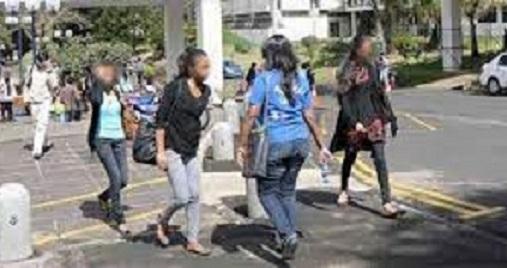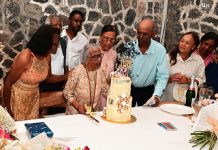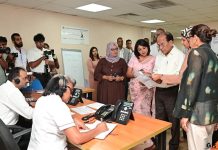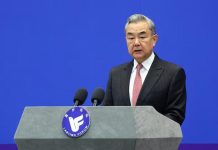Africa-Press – Mauritius. As part of the celebration of 50 years of the independence of Mauritius, Mauritius Times wanted to better understand what the young people of Mauritius and other islands of the Republic think, often considered as passive witnesses of the events.
I have therefore chosen to analyze 100 questionnaires from a first survey, even if this does not represent a representative sample, in order to give a general overview of the ideals of young people, their fears and their hopes for Mauritian society in 2018.
The results also reveal their opinions on the theme that mobilizes the Mauritian nation: the accession to independence 50 years ago. Profile of respondents
This questionnaire survey was conducted among 100 young people under the age of 25, with a large majority of young girls (83%). All the interviewees are single except for three young married women, two of whom live in urban areas and one in rural areas.
All have completed their secondary education and are enrolled in a university environment. 79% have their “HSC” in their pocket, 7% hold a “Diploma” and 10% have an undergraduate degree.
To the question concerning their “Ethnicity”, it appears that the majority of young people live their ethnic identity well in a multicultural context.
Their answers are given in relation to their religion or their community of belonging. One person, from a mixed couple, had no hesitation in affirming their dual cultural affiliation, valuing it as an asset.
She asserts herself as being mixed, belonging to two groups, “general population and Chinese”. It remains that some ignore the term “ethnicity” to assert only their national identity as “Mauritian” (3%) or planetary “human” (2%).
10% prefer not to state their affiliation and have opted for “Other”, either because they are still in the process of finding their personal identity or because they do not identify with any particular community.
Status of holidays associated with a holiday The young people had to name three public holidays in order of preference, which allowed me to situate the place they give to the March 12 public holiday.
Their first choice is for holidays that unite all ethnic communities in a single national spirit. Two national holidays are the most popular: “Christmas” and “New Year”. Two Hindu religious festivals come in second place. “Divali” is considered by many Mauritians to be a national holiday.
As for the “Maha Shivaratree”, more and more young Mauritians from all communities participate each year in the march to Grand Bassin to accompany their Hindu friends and discover this festival in a spirit of openness and mutual understanding.
Their third choice is six religious holidays and three secular holidays, which they would likely place emotional value on. Three Christian religious holidays: “Easter”, “Assumption” and the “Feast of the Dead”.
Three Hindu religious festivals: “Cavadee”, “Ganesh Chaturthi” and “Ougadi”. Three secular holidays: “Arrival of Indentured Labourers”, “Labour Day” and “Teachers’ Day”.
As for “Independence Day”, it is in second position, between national holidays and those with a strong emotional imprint. It is placed as a pocket handkerchief with three other feasts as follows:
a national and secular holiday, symbolizing the struggle to access the freedom of the individual asserting himself as a full human being – “the Abolition of Slavery”;
and two religious festivals characterized by the distribution of sweets to other members of one’s neighborhood, regardless of their ethnic community – “Eid-ul-Fitr” (celebration of the end of Ramadan) and the “Chinese Spring Festival” (celebration of the New Year with festivities, ancestor worship and wolf dance shows that enliven the streets for a few days).
Status of holidays associated with a holiday Perceptions about independence The majority of young people believe that on Independence Day there is a sense of national belonging.
72% of young people celebrate Independence Day;
63% are proud of Independence Day;
31% consider it an “important public day off”. A few comments about this day indicate the feelings that drive them.
It is important for the unity of a country and its development. » “Everyone should be proud to be a Mauritian regardless of ethnicity or religious affiliation.
Our multiculturalism has a good image globally and is considered as an example to be followed worldwide. Mauritius is a country where solidarity and the spirit of sharing are important and unique.
Mauritius is a peaceful country where the majority of people can live peacefully. We have many rights and we benefit from free services like education and health.
A diversity of religions and peace reigning in a multicultural country. Proud of our history and struggle of our ancestors for independence and their sacrifices.
Patriotism brings a sense of belonging to the country. It is a great way to build the country’s identity and also the population’s national identity. Patriotism is felt from the heart.
You should not feel low when speaking about your Nation and sharing your culture. Young people mention the essential symbolic elements. Being emotional when one hears the National Anthem that takes one back to one’s roots.
Patriotism is something innate, that we feel deep inside us. It’s a strong feeling when you sing the national anthem. Everyone holding the Mauritian flag high and not only on Independence Day.
However, 24% do not celebrate Independence Day, considering March 12 to be an “ordinary day” or “a public holiday like any other”. A person “prefers to spend time with his family by the sea” on this day.
A young Hindu and another from the general population never celebrate this festival because “it is not a family practice”. Some people refuse to celebrate this day because of the political class.
They feel a sense of shame in relation to the image conveyed by politicians and therefore withdraw into their bubble in the form of passive protest. I am ashamed of my Government.
I don’t feel attached or committed because of the high political value attached to it rather than a national/social value. The Mauritian political sphere stinks racism, corruption, rottenness.
The leaders of the country are too corrupt and it is hard to be proud of the country. There is a fake freedom of expression as leaders do whatever they want.
Patriotism is declining because of daily hassles bothering Mauritians, like religious unrest and discrimination toward the lower and middle classes. ”
Some young people associate their indifference with a lack of knowledge about this event or they denounce the inconsistencies when they hear various versions of history in the media.
We do not know the real reason about Independence Day and the real story behind. ” “This is the day the country lost Diego Garcia to the British. » “Mauritians do not consider themselves as patriots.
They would rather think that they are free people due to the struggles of others. ” “People are more interested in the public holiday rather than the context itself.
”
“Many Mauritians do not know the real meaning of “Republic”. Source of Independence Knowledge
The majority of young people (76%) are aware of having limited knowledge about the history of Mauritius in general and the independence of their country, in particular.
They thus confirm a great weakness of National Education, decried several times by a number of Mauritian pedagogues. Nevertheless, the fact remains that primary school and national television are their two main sources of knowledge.
28% acquired knowledge on this subject during their schooling, underlining the pivotal role of primary school through a subject called “History & Geography”.
Only one person mentions that they had such information in college in “Social Studies”. 16% of respondents are history students in a university environment.
As a result, they have studied this topic and have in-depth knowledge. One person mentions the dissemination of information by the media, in particular the “national TV shows”.
Paradoxically, not all young people are aware of the importance of documenting the history of their country. They cite personal and institutional reasons, mainly pointing to the dilution of historical knowledge at the secondary level.
They are very critical of the lack of vision of institutional and political leaders to ensure the development of young people as informed and engaged citizens.
17% admit that they have no information about the circumstances leading to independence, either because they have forgotten what they learned in primary school or because they have never been interested in it topic.
Therefore, they never documented themselves. One person writes: “Education puts values aside. We are stuffed with knowledge to find a job. We are taught the values related to patriotism a few days before independence, thus giving us the impression that it is the affair of a day.
» The notion of patriotism has lost its fundamental value in Mauritian society.
Young people lose or no longer have a sense of duty to society and the nation. The Independence Day celebration is an annual routine. Youth are not aware of country facts. The political personalities associated with independence are shown in descending order in the graph below.
Three foreigners are associated with it: the Indians – “Mahatma Gandhi” and “Manilal Doctor”, and the British – “Queen Elizabeth” as well as 13 Mauritians including the great tribunes of the Labor Party. Political figures associated with independence
According to young people, the absence of two independent school subjects in the national educational curriculum – “History” and “Civic and Citizenship Education” (including the dissemination of knowledge on the most significant historical events of the Republic) generate a certain ignorance, which will prove dangerous in the medium term because “people do not understand its real meaning”.
The vast majority, 95% of respondents, believe that “the History of Mauritius” as a school subject must be introduced in good and due form in schools.
The teaching of patriotic values should begin at an early age at home and at school. There is still a need to reinforce the mentality: “As one People, as one Nation.
» Respect for the national flag and the national anthem should be taught. This respect is in decline or has disappeared because Mauritians lack information about the deep meaning of the Republic and patriotism.
Appropriate education should be implemented to develop their awareness and also discipline the youth. Young people’s concerns The majority of young people (89%) believe that Mauritius is a good country to live in.
One person believes that Mauritian behavior is shaped by multiculturalism, fostering a culture of tolerance and peace in Mauritius or elsewhere. 68% think it is a suitable place to raise children. However, the responses are also nuanced in relation to the realities observed and/or experienced in various fields.
Politics: 5% point out the shortcomings of the political class, a source of great tension for them: “political instability”, “association with the drug mafia”, “corruption of institutions”, “unwelcome links developed by rubbing shoulders with religion” and recurring business such as the “Metro Express”.
“Politics has become a joke which is the main cause for this loss of patriotism”.
“Governments are selfish.
Economic: According to several interviewees (79%), independence has been beneficial for the people of Mauritius, with an unequal distribution of benefits by social class.
Not all benefited from the advantages following independence (75% – the rich, 69% – the middle class, 51% – the poor). 56% are apprehensive about the cost of living.
Professional: 91% fear “the high unemployment rate”, “the absence of job opportunities” and “limited jobs in certain fields”. 29% don’t think it’s possible to make progress in the workplace.
Young people are worried about “corruption” and the “lack of meritocracy”. 37% and 16% of young people mention their fear because of the existence of discrimination in relation to employment in the private sector and the public sector respectively.
7% are worried about the existence of “racism” and “communalism” in the professional field.
Social: 57% are worried about their personal safety and the decline of Law and Order. 4% report social scourges: “heavy atmosphere in the place of life”, in particular because of “drugs”, “prostitution”, “insecurity” due to “racism” and “harassment in the street “.
Cultural: The loss of values and the absence of opportunities preoccupy young people. “Compared to other Western countries, Mauritius is still a good place to live.
But Mauritius is being influenced by Western cultures and losing its values. » “We still lack certain opportunities, for example, books in bookshops. »
As “there is an increasingly accentuated loss of ancestral values”, for young people, they believe that certain institutions do not serve the Nation. These are shown in the graph.
77% believe they are willing to immigrate if such an opportunity were to arise. The motivations for leaving Mauritian soil are of two kinds. Improved quality of life
41% believe they have opportunities in general to improve their life economically with 31% believing that immigration will open up more professional opportunities for them and facilitate their path to a career.
11% think that the salary will be higher elsewhere and will therefore better cover the cost of living.
21% think there will be more security elsewhere. Personal development Another group of young people (21%) opt for immigration in order to change their way of life and become more independent.
They consider that it would be a chance to discover new horizons, to gain maturity, to go on an adventure to discover new cultures. A person would like to acquire an additional nationality in order to better satisfy his desires.
Independence and Celebrations For 44% of the interviewees, the day of the celebration of Independence and the acquisition of the status of Republic represent at the same time a political, social, cultural and national event. Others give it specific importance as indicated by the percentages in the chart. Two main reasons are given for celebrating Independence.
Sense of belonging to the Republic: 10% feel respect for the country, 13% are proud of the achievements of the Republic, 21% celebrate Mauritian identity characterized by solidarity between communities in a multicultural Republic, 42% attach to the freedom acquired thanks to the struggle of the ancestors against colonization and domination: they are proud to belong to an independent Nation which respects the memory of the past.
A tradition: For 9%, they celebrate Independence because it is a tradition inherited from their first schooling in nursery school until their time in university.
They appreciate being given free cakes and fruit juice and some like to attend the show which takes place at the Champ de Mars. Some young people are critical of the huge expenditure incurred by the government to celebrate Independence Day.
Other young people made some suggestions for, on the one hand, better planning intercultural encounters and facilitating socialization between ethnic groups on Mauritian soil and, on the other hand, better supervising the population in the islands of the Republic to develop a patriotic feeling on independence day.
Dissemination of intercultural knowledge: Young people offer “food festivals”, “cultural programmes”, “cultural fairs” and “fashion shows” with parallel artistic activities for young and old to facilitate interactions between Mauritians while having fun and growing.
Delocalized animations: Delocalized animations would facilitate intercultural encounters. Some young people offer meetings around a fireworks display.
Dissemination of historical knowledge: They propose to organize activities in schools and also in the workplace: “inspirational talks”, “exhibitions”; “workshops”, “talks and activities to develop patriotism”, “projection of films, documentaries, important events” and also “painting and essays about ancestors”.
Organization of activities to illustrate patriotism in action: This is to reduce the current expenses used to organize a national holiday with great fanfare and also to cover the costs associated with the visit by invitation of a foreign politician each year.
The young people lean rather in favor of improving the fate of Mauritians through the establishment of a system for better listening to their grievances that day, and also attentive listening to the needs of other peoples of the world.
They are in favor of sharing and donations to orphans, the poor and other needy. On a more pragmatic note, the young people draw on their experiences during the Independence celebrations to identify some weaknesses.
Political messages: Young people think that the format of the Prime Minister’s message, totally unsuitable in the current state, for young people should be reviewed. The message should be declined in a format that would be more “child friendly”.
Cultural celebrations: Young people would like to see more access to artists for the celebration at the Champ de Mars instead of always having the same annual parades with the same actors.
They take a critical look at the fact that it is always one and the same state college for girls that parades in the company of the police. They believe that the school world should be better represented at the celebrations through other innovative activities. They propose that the speeches of politicians be cultural and not focused on political politics when they speak.
For More News And Analysis About Mauritius Follow Africa-Press







